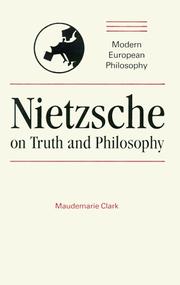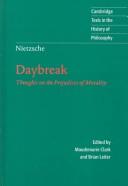| Listing 1 - 6 of 6 |
Sort by
|

ISBN: 0521348501 0521343682 9780521348508 0511624727 9780511624728 9780521343688 Year: 1990 Volume: *19 Publisher: Cambridge Cambridge University press
Abstract | Keywords | Export | Availability | Bookmark
 Loading...
Loading...Choose an application
- Reference Manager
- EndNote
- RefWorks (Direct export to RefWorks)
Friedrich Nietzsche haunts the modern world. His elusive writings with their characteristic combination of trenchant analysis of the modern predicament and suggestive but ambiguous proposals for dealing with it have fascinated generations of artists, scholars, critics, philosophers, and ordinary readers. Maudemarie Clark's highly original study gives a lucid and penetrating analytical account of all the central topics of Nietzsche's epistemology and metaphysics, including his views on truth and language, his perspectivism, and his doctrines of the will-to-power and the eternal recurrence. The Nietzsche who emerges from these pages is a subtle and sophisticated philosopher, whose highly articulated views are of continuing interest as contributions to a whole range of philosphical issues. This remarkable reading of Nietzsche will interest not only philosophers, but also readers in neighbouring disciplines such as literature and intellectual history.
Theory of knowledge --- Nietzsche, Friedrich W. --- Truth --- Vérité --- Waarheid --- Nietzsche, Friedrich Wilhelm, --- Contributions in concept of truth --- Truth. --- 1 NIETZSCHE, FRIEDRICH --- 165.724 --- Filosofie. Psychologie--NIETZSCHE, FRIEDRICH --- Nietzsche --- 165.724 Nietzsche --- 1 NIETZSCHE, FRIEDRICH Filosofie. Psychologie--NIETZSCHE, FRIEDRICH --- Nietzsche, Friedrich --- Vérité --- Contributions in concept of truth. --- Conviction --- Belief and doubt --- Philosophy --- Skepticism --- Certainty --- Necessity (Philosophy) --- Pragmatism --- Nietzsche, Friederich --- Nietzsche, Friedrich Wilhelm --- Arts and Humanities
Book
ISBN: 9780521793803 9780521790413 9781139032865 0521793807 9781139525572 1139525573 1283528371 9781283528375 1139032860 1139530240 9781139530248 9781139531436 1139531433 0521790417 1139539590 110722540X 9786613840820 1139526774 1139527967 Year: 2012 Publisher: New York Cambridge University Press
Abstract | Keywords | Export | Availability | Bookmark
 Loading...
Loading...Choose an application
- Reference Manager
- EndNote
- RefWorks (Direct export to RefWorks)
This book presents a provocative new interpretation of Beyond Good and Evil, arguably Nietzsche's most important work. The problem is that it appears to express merely a loosely connected set of often questionable opinions. Can Nietzsche really be an important philosopher if this is his most important book? Maudemarie Clark and David Dudrick address this question with a close reading that emphasizes how Nietzsche writes. They argue that the first part of Beyond Good and Evil presents coherent and interconnected arguments for subtle and well-thought-out positions on traditional issues. Nietzsche's infamous doctrine of the will to power turns out to be a compelling account of the structure and origin of the human soul. And although he rejects some aspects of traditional philosophy, Nietzsche's aim is to show how philosophy's traditional aspirations to seek both the true and the good can be fulfilled. Beyond Good and Evil turns out to be a major work of philosophy and Nietzsche's masterpiece.
Nietzsche, Friedrich Wilhelm, --- Philosophy, Modern. --- Modern philosophy --- Arts and Humanities --- Philosophy
Digital
ISBN: 9781139032865 Year: 2012 Publisher: Cambridge Cambridge University Press
Abstract | Keywords | Export | Availability | Bookmark
 Loading...
Loading...Choose an application
- Reference Manager
- EndNote
- RefWorks (Direct export to RefWorks)
Book
ISBN: 9780199371846 Year: 2015 Publisher: Oxford [etc.] Oxford University Press
Abstract | Keywords | Export | Availability | Bookmark
 Loading...
Loading...Choose an application
- Reference Manager
- EndNote
- RefWorks (Direct export to RefWorks)
Political philosophy. Social philosophy --- General ethics --- Nietzsche, Friedrich W. --- Nietzsche, Friedrich

ISBN: 0872202836 Year: 1998 Publisher: Indianapolis (Ind.): Hackett
Abstract | Keywords | Export | Availability | Bookmark
 Loading...
Loading...Choose an application
- Reference Manager
- EndNote
- RefWorks (Direct export to RefWorks)

ISBN: 0511812043 0511005512 9780511005510 9780511812040 0521590507 0521599636 9780521599634 9780521590501 Year: 1997 Publisher: Cambridge Cambridge University Press
Abstract | Keywords | Export | Availability | Bookmark
 Loading...
Loading...Choose an application
- Reference Manager
- EndNote
- RefWorks (Direct export to RefWorks)
Daybreak marks the arrival of Nietzsche's 'mature' philosophy and is indispensable for an understanding of his critique of morality and 'revaluation of all values'. This volume presents the distinguished translation by R. J. Hollingdale, with a new introduction that argues for a dramatic change in Nietzsche's views from Human, All Too Human to Daybreak, and shows how this change, in turn, presages the main themes of Nietzsche's later and better-known works such as On the Genealogy of Morality. The main themes of Daybreak are located in their intellectual and philosophical contexts: in Nietzsche's training as a classical philologist and his fascination with the Sophists and Thucydides; in the moral philosophies of Kant and Schopenhauer, which are the central foci of Nietzsche's critique of morality; and in the German Materialist movement of the 1850s and after, which shaped Nietzsche's conception of persons. The edition is completed by a chronology, notes and a guide to further reading.
Prejudices. --- Ethics. --- Deontology --- Ethics, Primitive --- Ethology --- Moral philosophy --- Morality --- Morals --- Philosophy, Moral --- Science, Moral --- Philosophy --- Values --- Bias (Psychology) --- Prejudgments --- Prejudice --- Prejudices and antipathies --- Attitude (Psychology) --- Emotions --- Ethics --- Prejudices --- General ethics --- Préjugés --- Arts and Humanities
| Listing 1 - 6 of 6 |
Sort by
|

 Search
Search Feedback
Feedback About UniCat
About UniCat  Help
Help News
News